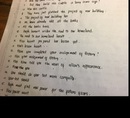Part 3: Error Identification (0.2 each)
There are 10 errors in the passage below, please identify them and write your answers in the
form of : “Line __ : error -> your correction”.
E.g Line 1: this -> that
Lưu ý: nếu sửa thành bỏ trống, điền “Null”
| Line 1 Line 5 Line 10 Line 15 Line 20 Line 25 Line 30 | There is a difference between hating a song so much you want to turn off the radio, and hating a song that brings tears to your eyes but compelled you to listen. In the second case, the listener connects with the song, established an emotional connection. The listener transcends the notes, the melody, and the words sung to find a deepest meaning: something that rings true for them and only them. A different person can listen to the same exact song in the same exact setting and get something entirely different out of it. And that’s the beauty of music. On paper, music looks exactly the same to all observers. Blobs of ink formed into music notes and words, not conveying much emotion. Yes, those who have more experientiality with music will get a different feeling from it, identifiable specific chords and notes and tricky rhythms. But, it isn’t until we hear music that our experiences of it really begin to differ. We hear the emotion conveyed in the voice of the singer and the ferocity with what the violinist attacks their strings. We hear the emotion in the pounding of the drummer and the melody of the guitar and the harmony of the piano and cello. The words in the song take on new meaning and the chords come together to produce new emotions. They can be major and happy or minor and depressed, combining with the other chords, words, and instruments to produce very specific harmonies. And our experience with this music is determined by our past experiences. With other songs similar or very differing from that one and experiences in our life outside of music entirely. Maybe a lyric reminds you of a specific time in your life, a certain thing someone said to you, or a certain place you were. Maybe the melody makes you joyfully happy and reminds you of a time you felt a similar emotion. In this way, the song entwines your experiences and emotions, make them inseparable. The songs not only remind us of things from our lives, but they also become representations of concepts or specific parts of them. |





 Giups mik vs ah
Giups mik vs ah


